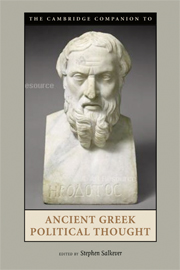Book contents
- Frontmatter
- Introduction
- 1 Homer and Political Thought
- 2 Foundings vs. Constitutions: Ancient Tragedy and the Origins of Political Community
- 3 Most Favored Status in Herodotus and Thucydides: Recasting the Athenian Tyrannicides through Solon and Pericles
- 4 Thucydides and Political Thought
- 5 “This Way of Life, This Contest”: Rethinking Socratic Citizenship
- 6 The Political Drama of Plato’s Republic
- 7 Practical Plato
- 8 Reading Aristotle’s Nicomachean Ethics and Politics as a Single Course of Lectures: Rhetoric, Politics, and Philosophy
- 9 Lived Excellence in Aristotle’s Constitution of Athens: Why the Encomium of Theramenes Matters
- 10 The Virtue Politics of Democratic Athens
- 11 Origins of Rights in Ancient Political Thought
- 12 The Emergence of Natural Law and the Cosmopolis
- Select Bibliography
- Index
2 - Foundings vs. Constitutions: Ancient Tragedy and the Origins of Political Community
Published online by Cambridge University Press: 28 September 2009
- Frontmatter
- Introduction
- 1 Homer and Political Thought
- 2 Foundings vs. Constitutions: Ancient Tragedy and the Origins of Political Community
- 3 Most Favored Status in Herodotus and Thucydides: Recasting the Athenian Tyrannicides through Solon and Pericles
- 4 Thucydides and Political Thought
- 5 “This Way of Life, This Contest”: Rethinking Socratic Citizenship
- 6 The Political Drama of Plato’s Republic
- 7 Practical Plato
- 8 Reading Aristotle’s Nicomachean Ethics and Politics as a Single Course of Lectures: Rhetoric, Politics, and Philosophy
- 9 Lived Excellence in Aristotle’s Constitution of Athens: Why the Encomium of Theramenes Matters
- 10 The Virtue Politics of Democratic Athens
- 11 Origins of Rights in Ancient Political Thought
- 12 The Emergence of Natural Law and the Cosmopolis
- Select Bibliography
- Index
Summary
The characters who inhabit ancient tragedy continue to burn themselves into our consciousness. Oedipus, Antigone, Clytemnestra, and Electra all offer us visions of heroes and villains, personalities and psychologies caught in the labyrinthine consequences of their own characters and of fate. Yet, ancient tragedy goes well beyond the portrayal of the actions and choices of these commanding figures. Through the presentation of an Antigone or an Oedipus or an Orestes, it explores as well the challenges entailed in the founding of political communities. Today, whether we turn to the newly democratizing states or the issues surrounding the creation of a political union in Europe, our understanding of political beginnings and communal life often resides in the process of constitution making, the creation of institutions, and legal safeguards intended to provide for the security and protection of individual freedom. The ancient Athenians, writing long before the legalistic language of constitutions came to define political foundings, grappled with a range of issues that force us to reflect on the beginnings of political communities and to take those concerns well beyond the abstract legalistic focus that dominates the contemporary process. The tragedians recognize the myths, the gender-laden choices, the exclusions at the base of assertions of political order.
- Type
- Chapter
- Information
- Publisher: Cambridge University PressPrint publication year: 2009

